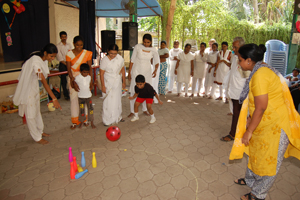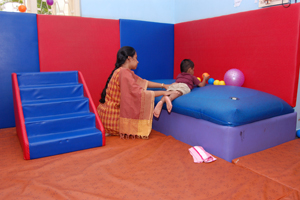Early Intervention
The Need for Early Intervention
Early Intervention programs offered by V-Excel are focused on children between 0 - 7 years of age and aim to understand their developmental challenges and provide appropriate intervention. The intent of this timely intervention is to enable mainstreaming early in life.

Significant changes take place in the early years - development of the child’s perceptual skills, sensory skills, motor skills, conceptual skills and cognitive skills. In the first seven years, the four lower human senses like touch, movement, balance, and physical well-being, are particularly important for the development of every child. These bodily senses are their primary means for a child to understand themselves and in most children with disabilities, these senses are impaired.
In our experience, late referral of children to intervention has been a key challenge to addressing these issues.
At our EI center, we design therapeutic programs for early intervention to prevent disorders that may arise from genetic condition, adverse circumstances and developmental delays. Evaluation of the child’s sensory and developmental needs, along with inputs from the doctor’s report, consultation with parents and observations from house visits forms the basis of the child’s sensory integration and diet program. The process followed for each child is includes a Comprehensive Sensory Assessment, Designing the development plan, Implementation of the customized plan and ongoing monitoring (re-designing of the program if needed) of the child's progress.
Our uniqueness lies in the fact that we have an excellent multi-disciplinary approach that includes a panel of experts such as sensory integration therapists, occupational therapists, speech and communication facilitators, counselors, special educators, etc. and this team create a unique program based the individual child's needs.
What Makes Our Program Unique :
Our Early Intervention service is unique in many ways:
• Sensory Integration is only a part of the development process. Sensory Diet makes it comprehensive with the inclusion of motor, cognitive, social skills.
• We do not confine ourselves to Center-based work. Parental support and home programs ensure consistency.
• Child-focus coupled with parent counseling advocates a child’s progress.
• With many school related pressures and increased emphasis on writing in early years, we have introduced special education in writing skills and have school readiness program.
• We work with regular teachers and play schools closely for inclusion.
• Understanding the need for Systematic and scientifically done Early Intervention services, we have invested huge capital for these equipments and materials.
• We are also considering more information dissemination work with neonatologists, pediatricians and neurologists as their ignorance is a high price paid by the children and their parents. Awareness generation workshops for teachers and parents are also a natural and necessary extension of our work for the Early Intervention Program.
Our primary focus areas include neuro-sensory development, functional independence, school readiness and social skills, which are extremely important for a child’s holistic growth.

The beneficiaries of this project are children who have already developed, or at risk of developing, either a handicapping condition or some other special need that may affect their overall development. This includes children with Autism, Intellectual Disabilities, Attention Deficit Disorders, Delayed Milestones, Learning Disabilities like Dyslexia etc.






